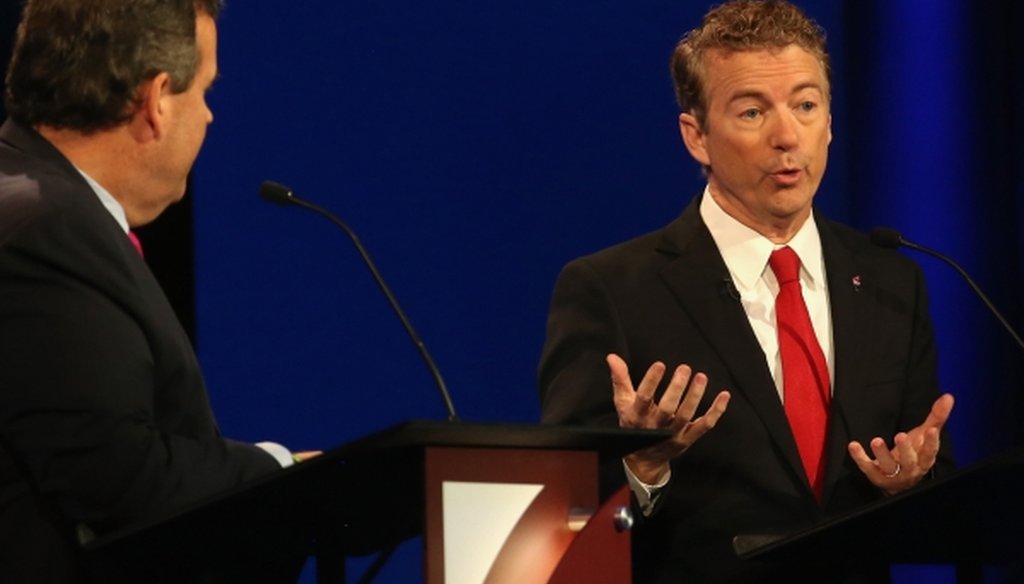



Presidential candidate Rand Paul speaks while New Jersey Gov. Chris Christie looks on during the CNBC Republican presidential debate in Boulder, Colo. (Justin Sullivan/Getty Images)
A bipartisan, bicameral deal to stave off a possible government shutdown and a breaching of the federal debt limit is now on its way to President Barack Obama’s desk. But as it was moving toward congressional approval, some Republican presidential candidates spoke out against it during the GOP debate in Boulder, Colo., arguing that it represented an abdication of fiscal responsibility.
One of the critics at the debate was Sen. Rand Paul, R-Ky. "Now, on the floor of the Congress, the Washington establishment from both parties puts forward a bill that will explode the deficit," Paul said. "It allows President Obama to borrow unlimited amounts of money."
We wondered if Paul was accurately describing the bill, so we took a closer look.
The measure in question is the Bipartisan Budget Act of 2015. (Here’s a summary.) The part of the bill that Paul is referring to -- section 901 -- would temporarily lift the limit on how much money the federal government is permitted to borrow. If the debt limit had not been lifted, the government wouldn’t have been able to pay its outstanding debts, with potentially serious economic consequences and negative reactions from equity and other markets.
Historically, the most common mechanism for raising the debt limit was to set a new cap in dollars. Usually, it was possible to estimate how much time would pass before this limit would be reached, based on expected spending patterns, but it was only an estimate.
The current legislation, however, utilizes a mechanism that has been used a few times in the past few years. Rather than setting a new dollar amount, it suspends the debt limit until a date certain -- March 15, 2017, which is a few months after a new president and a new Congress are sworn in. So under the newly passed legislation, there is no longer a dollar limit on how much debt the United States can accrue.
However, it’s an exaggeration to say that the measure "allows President Obama to borrow unlimited amounts of money."
To understand why this is so, we’ll take a look at the two types of federal spending -- mandatory spending (which includes both interest on the debt and expenditures commonly known as "entitlements") and discretionary spending.
Generally speaking, mandatory spending is determined by a fixed formula and continues on autopilot until Congress and the president change the rules. Discretionary spending, by contrast, must be approved periodically in appropriations bills passed by Congress and signed by the president.
For mandatory spending, there is no cap on the amount of mandatory spending, only a date in the future when the debt limit is reimposed. That said, mandatory spending is considered unlikely to increase beyond current projections since it is set by formulas that are relatively straightforward to predict.
And Paul exaggerates in attributing this spending to Obama. "Unlimited" mandatory spending would continue regardless of Obama’s actions. Without a bill to change the formulas driving mandatory spending, passed by Congress and signed by the president, this spending would continue. One big example of mandatory spending is Medicare, the popular government-run health insurance program for those over age 65.
Paul’s comment is even more inaccurate as it concerns discretionary spending -- the kind of spending that Obama can more directly affect (though even then only with the consent of Congress).
The legislation, in addition to temporarily suspending the debt ceiling, forestalled the immediate possibility of a government shutdown, which could have occurred if spending authority for federal agencies had expired. It did this by outlining new discretionary spending levels for the next two fiscal years.
The legislation raises the maximum amount the government can spend on both the military and nonmilitary categories of discretionary spending for fiscal years 2016 and 2017. But while this is an increase, it’s not an unlimited increase. Discretionary spending is capped, and unless Obama and the Republican-controlled Congress agree to raise those limits through new legislation, it won’t go any higher than the spending caps in the bill.
Our ruling
Paul said the debt limit deal "allows President Obama to borrow unlimited amounts of money."
Under the just-passed legislation, there is no specific dollar amount of debt that the United States can incur between now and March 15, 2017. But discretionary spending is indeed limited by the same bill. Mandatory spending, meanwhile, can be considered unlimited, but that is not something that Obama has unilateral power over, as Paul’s claim suggests. This mandatory spending is set by longstanding formulas, which can only be changed by Obama in concert with both chambers of Congress.
The claim contains an element of truth but ignores critical facts that would give a different impression, so we rate it Mostly False.
CNBC Republican debate in Boulder, Colo., transcript, Oct. 28, 2015
U.S. House of Representatives, "Bipartisan Budget Act of 2015, Section-by-Section Summary," accessed Oct. 29, 2015
Text of Bipartisan Budget Act of 2015
Bipartisan Policy Center, "Interactive: Recent History of the Debt Limit," accessed Oct. 30, 2015
Committee for a Responsible Federal Budget, "The Budget Deal Allows Obama To Borrow Unlimited Amounts," Oct. 28, 2015
Email interview with Steve Ellis, vice president of Taxpayers for Common Sense, Oct. 29, 2015
In a world of wild talk and fake news, help us stand up for the facts.
